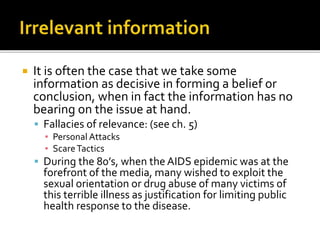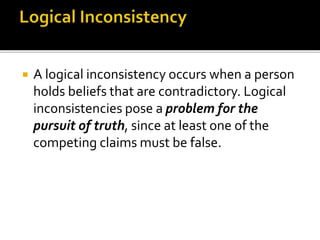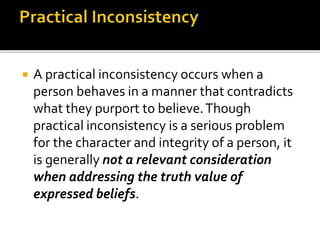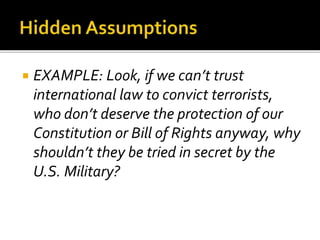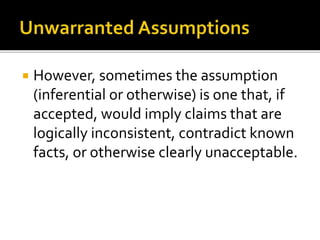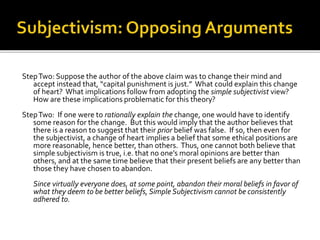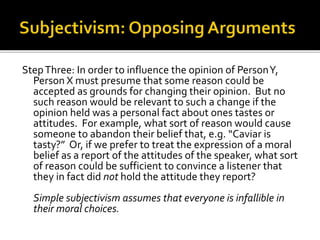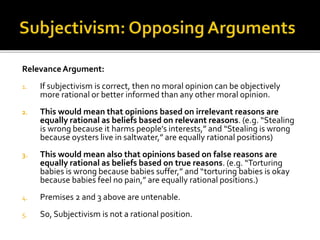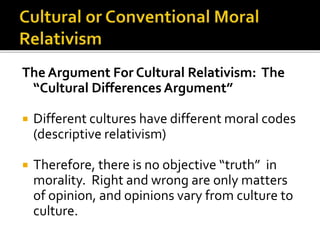Barriers to critical thinking
- 2. We often draw conclusions based on wholly inaccurate information. Often, we are unaware that the reasons we give in favor of a conclusion or belief are themselves suspect. We often draw conclusions based on true information, while neglecting context or conflicting information that significantly changes the meaning or force of the original information. Often we rely on information that is irrelevant to the conclusions we draw.
- 3. Garbage In, Garbage Out: Some serious errors in recent history involve the use of false information: The mistaken claim that Saddam Hussein’s regime in Iraq possessed WMDs (as a primary reason to invade Iraq) The mistaken claim that childhood inoculations were a cause of autism (as a reason to resist the vaccination of children against dangerous childhood illness)
- 4. Sometimes even true and verifiable information can, if incomplete or stripped of context, lead to hasty or false conclusions. Consider the following brief clip regarding the firing of Shirley Sherrod at the USDA. In what sense is the information used in this decision true, and yet misleading? http://www.nbcnews.com/id/38321920 NAACPTea Party resolution: https://www.naacp.org/news/entry/naacp-delegates-vote- to-repudiate-racist-elements-within-the-tea-pary/ MSNBC Interview with Breitbart: http://www.nbcnews.com/id/38321920#.VXXqUtJViko Are Breitbart’s claims, namely that the NAACP is hypocritical in condemning racist behavior in theTea Party, relevant and accurate here?
- 5. Example, Confirmation Bias: “In psychology and cognitive science, confirmation bias (or confirmatory bias) is a tendency to search for or interpret information in a way that confirms one's preconceptions, leading to statistical errors.” –from Science Daily
- 6. It is often the case that we take some information as decisive in forming a belief or conclusion, when in fact the information has no bearing on the issue at hand. Fallacies of relevance: (see ch. 5) ▪ Personal Attacks ▪ ScareTactics During the 80’s, when the AIDS epidemic was at the forefront of the media, many wished to exploit the sexual orientation or drug abuse of many victims of this terrible illness as justification for limiting public health response to the disease.
- 7. Superiority bias occurs when a person has a hyperbolic or inflated self-image. Sometimes this occurs when a person believes that their success in one area or field implies that their views on other, unrelated matters, deserves respect as well. EXAMPLE: Max is a widely respected CEO and entrepreneur. He has created and led a number of highly successful businesses. Hence, he reasons, his views on economics, politics, morality and other such matters deserve special attention.
- 8. The superiority bias occurs when a person has a hyperbolic or inflated self-image. Sometimes this occurs when a person refuses to revise their self-image even when presented with reliable evidence that their self-image is distorted. http://www.youtube.com/watch?v=ZJpHM9LL6Qc&featur e=related A similar obstacle to critical thinking is an exaggerated sense of self-loathing or an unreasonable negative self- image (or inferiority bias) that is not reflective of objective evidence to the contrary.
- 9. When a person grants undue weight or priority to their own interests to the expense of others interest, they are guilty of self- interested thinking. Generally, self-interested thinking involves a belief that is held primarily on the basis of selective and biased evidence that ignores reasons that conflict with a person’s perceived self-interest.
- 10. EXAMPLE: Sandy placed a bet on theWarriors. If the Warriors beat the spread (7 pts) then she stood to win $500. In the fourth quarter, theWarriors had the ball with six seconds left in the game.TheWarriors were up by 6 points. Stephen Curry had the ball, drove the lane, running directly into the defensive player as he laid the ball in the hoop.The referee called a charging foul, thus cancelling the two points and ending the game with theWarriors up by 6. Sandy protested that it was obviously a bad call. Though it is possible that the call was not accurate and fair, it is probable that Sandy’s perspective is biased by her desire to have won the bet.
- 11. EXAMPLE:Will has a portfolio of stock investments in several Fortune 500 companies. If the proposed bill in the legislature passes, raising taxes on capital gains,Will stands to lose several thousands of dollars each year.Will opposes the bill, claiming it will harm job growth. Though it is possible thatWill has the relevant expertise to judge whether the tax bill will have a negative effect on job growth, it is likely that his perspective is biased by his personal interest in the bill being defeated.
- 12. Group bias occurs when one considers their own group to be inherently better than others. Generally, this is demonstrated by the biased application of principles to the assessment of similar or even identical behaviors or beliefs of groups other than our own. Common forms of group bias include Xenophobia, Racism, Sexism, Classism, and Nationalism.
- 13. The biggest problem every military in history has faced is persuading both civilian populations and soldiers to do something they are naturally reluctant to do, i.e. killing other human beings. One of the best known ways to overcome this obstacle is to dehumanize the enemy with disparaging epithet and degrading characterizations or stereotypes. Once the “enemy” populations are seen to be, not human, but instead “gooks,” “nips,” “krauts,” “rag heads,” “godless communists” etc., that don’t value life like “we” do, actions that were otherwise unthinkable become possible. (Paraphrase from Capt. Paul Chappell)
- 14. Is racial profiling as bad as some say? Consider the issues raised in this brief film: http://www.upworthy.com/know-anyone-that-thinks-racial-profiling-is- exaggerated-watch-this-and-tell-me-when-your-jaw-drops-2?c=bl3 Are “sexual violence” or “gender violence” best understood as “women’s issues?” Consider the issues raised in this brief film: http://www.ted.com/talks/jackson_katz_violence_against_women_it_s_ a_men_s_issue.html
- 15. Example:What the Nazis did to Jews in Europe, the Hutus did toTutsis in Rwanda, and what theTurks did to Armenians in the Ottoman Empire was clearly genocide. American pioneers, assisted by Federal policy and the U.S. military, on the contrary, engaged in western expansion and manifest destiny.They helped tame the wilderness so that progress could proceed.
- 16. Conformism is our tendency to follow the crowd and accede to conventional authority Milgram Asche ▪ Mi Lai and Abu Ghraib ▪ Consumerism and mimetic desire ▪ Economic Bubbles ▪ Fads, peer pressure, etc. ▪ Bystander Effect ▪ Stanford Prison Experiment: http://www.prisonexp.org/
- 17. A logical inconsistency occurs when a person holds beliefs that are contradictory. Logical inconsistencies pose a problem for the pursuit of truth, since at least one of the competing claims must be false.
- 18. Often, a logical inconsistency occurs when a person (perhaps unknowingly) applies some basic principle or belief differently in considering distinct issues: EXAMPLE: Abortion is wrong. A fetus is a human life and human life is sacred and should never be intentionally destroyed. EXAMPLE:The death penalty is the only appropriate punishment for murder.Those who kill innocent human beings must pay the ultimate price for their crimes. Belief 1: It is always wrong to intentionally destroy human life. Belief 2: It is sometimes right to intentionally destroy human life.
- 19. It is important to note that often, what appears to constitute a logical inconsistency can be considerably mitigated or even eliminated by the inclusion of a qualifier. For example: Belief 3: It is always wrong to intentionally destroy innocent human life.
- 20. Sometimes a logical inconsistency occurs as a result of a self-referential inconsistency, where a specific claim leads to contradictory beliefs: EXAMPLE: “This statement is false.” EXAMPLE: “All truth is relative.”
- 21. Sometimes two beliefs are not obviously in conflict, but when considered more carefully they present potential issues of inconsistency: Every event in nature is the necessary result of a preceding cause. Human beings are morally responsible for their behavior. God is omniscient. Human beings are morally responsible for their behavior.
- 22. A practical inconsistency occurs when a person behaves in a manner that contradicts what they purport to believe.Though practical inconsistency is a serious problem for the character and integrity of a person, it is generally not a relevant consideration when addressing the truth value of expressed beliefs.
- 23. EXAMPLE: ReverendTed Haggard, a prominent evangelical pastor and vocal opponent of gay rights and homosexual behavior was recently exposed as having maintained a sexual relationship with a male prostitute. EXAMPLE:Senator John Edwards has long represented himself as a champion of the underprivileged in the war on poverty.Yet he served as a high paid consultant to Fortress Investment Group which owned a major stake in GreenTree Servicing LLC, which rose to prominence in the 1990s selling subprime loans to mobile-home owners and now services subprime loans.
- 24. Following the shooting of Arizona representative Gabrielle Giffords, some in the media criticized Sara Palin for her rhetoric, including a controversial map that placed crosshairs over swing districts (including Giffords’).The charge was that inflammatory rhetoric, specifically the use of military metaphor, contributed to acts of violence against political figures. “Acts of monstrous criminality stand on their own,” Ms. Palin said in a seven-and-a-half minute video posted to her Facebook page. “Especially within hours of a tragedy unfolding, journalists and pundits should not manufacture a blood libel that serves only to incite the very hatred and violence that they purport to condemn.That is reprehensible.” From: NYT, January 12, 2011, 8:15 am “Palin Calls Criticism ‘Blood Libel’”, By MICHAEL D. SHEAR
- 25. Claim One: Political rhetoric in the media does not incite hatred and violence and speakers (i.e. Palin) are not responsible for crimes committed as a result. ClaimTwo: Political rhetoric in the media does incite hatred and violence and speakers (i.e. journalists critical of Palin) are responsible for any crimes committed as a result.
- 26. “Be Aware” of Assumptions vs. “Beware” of Assumptions Critical thinkers strive to make their assumptions explicit to themselves and those they hope to persuade.We should acknowledge our assumptions and actively expose them to rigorous critique.
- 27. EXAMPLE:We hold these truths to be self- evident, that all men are created equal, that they are endowed by their Creator with certain unalienable Rights, that among these are Life, Liberty and the pursuit of Happiness.
- 28. When assumptions are hidden from ourselves and others, we often end up tacitly accepting claims that, if made explicit, we would likely reject.
- 29. EXAMPLE: Look, if we can’t trust international law to convict terrorists, who don’t deserve the protection of our Constitution or Bill of Rights anyway, why shouldn’t they be tried in secret by the U.S. Military?
- 30. We are able to effectively determine that the suspects in question are terrorists prior to any trial. At least where terrorism is concerned, it is appropriate to hold some individuals guilty until proven innocent.
- 31. Often, assumptions provide a logical bridge of support between one claim and another. These assumptions play an inferential role in a line of reasoning. Generally, this is not a problem, so long as the unstated claim is not intentionally obscured and the assumption does not pertain to some legitimately controversial subject.
- 32. EXAMPLE: God has every virtue. So God must be benevolent. Assumption: “Benevolence is a virtue.” EXAMPLE: All mammals possess mammary glands. Hence, blue whales possess mammary glands. Assumption: “Blue whales are mammals.”
- 33. However, sometimes the assumption (inferential or otherwise) is one that, if accepted, would imply claims that are logically inconsistent, contradict known facts, or otherwise clearly unacceptable.
- 34. EXAMPLE: No one can definitively prove that “God does not exist.” So, it is reasonable to suppose that God does exist. EXAMPLE: No one can definitively prove that “God does exist.” So, it is reasonable to suppose that God does not exist. ASSUMPTION: “When there is insufficient evidence to prove a claim is true, it is reasonable to accept that the claim is false.”
- 35. When assessing the views of others, never attribute a more extreme assumption to a speaker when a more moderate assumption would be sufficient. “War is wrong because it’s wrong to intentionally kill innocent human beings.” 1. All people killed in war are innocent. 2. It is never morally permissible to intentionally kill human beings. 3. All those who participate in war are immoral. 4. One should never engage in war. 5. In every war, at least some innocent human beings are intentionally killed.
- 36. When our primary reason for believing something is simply that we would prefer it be true, we are guilty of wishful thinking.
- 37. EXAMPLE: Many support the right of government to employ methods of broad and indiscriminate surveillance on the grounds that, “I have nothing to hide.” Surely, they suppose, anyone who is innocent of wrongdoing will not be harmed (at least not too much) by minor intrusions into their private lives. EXAMPLE: A random survey of 10,000 high school age girls revealed that a significant number of them believed it was impossible to become pregnant in their first sexual encounter.When asked to explain, most reported that to believe otherwise was just too frightening a prospect.
- 38. Relativism is a theory about the nature of truth. This theory holds that… There is no such thing as “objective” truth, only opinions which differ from person to person or society to society. No opinion is objectively superior to, or inferior to, any other opinion. All opinions are equally “true” relative to the speaker. Relativism is a serious Obstacle to Critical Thinking and should be avoided.
- 39. Clearly, there are appropriate and rational grounds for employing the concept of relativity in the pursuit of truth. EXAMPLES:Whether an object is to one’s left or right is relative to ones position. EXAMPLE:We can often better understand and empathize with others when we grasp and respect the importance of contingent perspectives.
- 40. Often it is claimed that a particular belief is “just an opinion.”This is to distinguish such a belief from “facts.” But, what exactly is the difference between opinions and facts? The term “opinion” is often used rhetorically to imply that the expressed belief is not yet established as a cultural norm or accepted statement in the relevant field of expertise or that the topic on which the belief is held is sufficiently complex as to prevent general consensus. The term “fact” is often used rhetorically to imply that the belief in question is well established in the community and, so, not in need of explicit defense. Hence, our question is not whether a statement of belief is a “fact” or an “opinion” but whether the statement is sufficiently supported by relevant reasons. In this sense, many facts are not broadly agreed to, and many opinions are very well established by reasons and so should not hold the negative connotation that the term “opinion” generally entails. ▪ In specific disciplines, the term “fact” is generally reserved for those statements regarding “what is the case” that are non-controversial among relevant experts. ▪ In dialogical settings, the term “fact” is generally reserved for those statements that are readily conceded to by the parties of the discussion. ▪ In science, the term “fact” is generally an statement supported by verifiable empirical data and is often contrasted with “theory” which is intended to a conceptual framework for explaining a set of facts or concepts. ▪ In philosophy, it is sometimes emphasized that there is an exclusive distinction between “facts” and “values.” But in some cases, the notion of “moral facts” is employed. ▪ In philosophy, the terms “fact” and “value” are used to indicate distinct kinds of issues or statements that require distinct kinds of support or evidence to settle disputes as to what is “true.”
- 41. An Issue is a question on which reasonable people disagree. Different types of issues call for different kinds of evidence. Evidence or reasons relevant to resolving one kind of issue are often insufficient or even irrelevant to resolving a different kind of issue. Often, problems are multifaceted, and involved several different types of issues.
- 42. Factual Issues: Questions pertaining to “what is the case” are factual issues.These are questions that are generally resolved through the empirical method (i.e. through verifiable observation or reference to reliable documentation derived therefrom). What is the cause of global climate change? Who won the first World Series? What constitutes a healthy diet?
- 43. Interpretive: Questions pertaining to meaning are interpretive in nature. Generally, these questions address issues of vague or unclear language and call for a definition and/or assessment of the context in which the terms and/or concepts are employed. What is the meaning of “person”? What is the meaning of “justice”? What does it mean to say something “works”?
- 44. Evaluative: Questions that address the worth or value of things are evaluative issues.These issues generally address questions of morality/ethics or beauty/aesthetics.Though relativism may be asserted in any issue, most proponents of relativism are concerned primarily with evaluative issues. Moral issues include questions such as: ▪ Is it wrong to deny same-sex couples equal access to civic marriage? ▪ Is it okay to cheat on your algebra exam? Aesthetic issues include questions such as: ▪ Is Beethoven's 9th Symphony a more important musical composition than Britney Spear’s Oops!...I Did it Again? ▪ Is my daughter’s Playdough sculpture of Sponge Bob more beautiful than Rodin’s sculpture TheThinker?
- 45. A complex issue is one that entails more than one distinct question. Often, resolving the main issue being addressed requires that underlying issues be resolved first. Most of the major issues we face are complex: Consider the moral evaluative issue, Should abortion be legal? This issue is difficult to resolve without first addressing… ▪ Interpretive questions such as “what is abortion?” and “what is a person?” ▪ Factual questions such as “when does a fetus acquire the physiological or psychological features of personhood?” or “what effects would outlawing abortion have on public health?” ▪ Evaluative questions such as “are the rights of fetuses to life more important than the right of a woman to self-determination?”
- 46. Simple Subjectivism: Meaning and Moral Claims “X is morally acceptable” “X is right” All mean: “X is good” “I (speaker) “X ought to be done” approve of X” “X is morally unacceptable” “X is wrong” All mean: “X is bad” “I (speaker) “X ought not to be done” disapprove of X
- 47. Rational Belief Argument: 1. If subjectivism is correct, then changing your moral beliefs could never be rationally justified. 2. Nearly everyone has, at some time, changed their belief on some moral matter for some identifiable reason. 3. Therefore, no one who accepts that a change in moral belief is reasonable can consistently maintain a subjectivist position.
- 48. Does Subjectivism Make Rational Sense? Step One: Consider the claim, “capital punishment is unjust,” and then translate this claim in terms of Simple Subjectivism Step One: Capital punishment is unjust. = “I (the speaker) approve of capital punishment.”
- 49. StepTwo: Suppose the author of the above claim was to change their mind and accept instead that, “capital punishment is just.” What could explain this change of heart? What implications follow from adopting the simple subjectivist view? How are these implications problematic for this theory? StepTwo: If one were to rationally explain the change, one would have to identify some reason for the change. But this would imply that the author believes that there is a reason to suggest that their prior belief was false. If so, then even for the subjectivist, a change of heart implies a belief that some ethical positions are more reasonable, hence better, than others. Thus, one cannot both believe that simple subjectivism is true, i.e. that no one’s moral opinions are better than others, and at the same time believe that their present beliefs are any better than those they have chosen to abandon. Since virtually everyone does, at some point, abandon their moral beliefs in favor of what they deem to be better beliefs, Simple Subjectivism cannot be consistently adhered to.
- 50. StepThree: Suppose person X believes that, “capital punishment is unjust,” and personY believes that, “capital punishment is just.” Now, suppose Person X is a simple subjectivist. On what grounds could person X attempt to persuade personY to change their view? Does this question even make sense in the logic of simple subjectivism? What difficulty does this pose for the theory of simple subjectivism?
- 51. StepThree: In order to influence the opinion of PersonY, Person X must presume that some reason could be accepted as grounds for changing their opinion. But no such reason would be relevant to such a change if the opinion held was a personal fact about ones tastes or attitudes. For example, what sort of reason would cause someone to abandon their belief that, e.g. “Caviar is tasty?” Or, if we prefer to treat the expression of a moral belief as a report of the attitudes of the speaker, what sort of reason could be sufficient to convince a listener that they in fact did not hold the attitude they report? Simple subjectivism assumes that everyone is infallible in their moral choices.
- 52. RelevanceArgument: 1. If subjectivism is correct, then no moral opinion can be objectively more rational or better informed than any other moral opinion. 2. This would mean that opinions based on irrelevant reasons are equally rational as beliefs based on relevant reasons. (e.g. “Stealing is wrong because it harms people’s interests,” and “Stealing is wrong because oysters live in saltwater,” are equally rational positions) 3. This would mean also that opinions based on false reasons are equally rational as beliefs based on true reasons. (e.g. “Torturing babies is wrong because babies suffer,” and “torturing babies is okay because babies feel no pain,” are equally rational positions.) 4. Premises 2 and 3 above are untenable. 5. So, Subjectivism is not a rational position.
- 53. Infallibility Argument: 1. If subjectivism is correct, then each of us is infallible in our moral judgments, at least so long as we are speaking sincerely. 2. However, we are not infallible, i.e. we may be mistaken, even when we are speaking sincerely. 3. Therefore, Subjectivism cannot be correct.
- 54. Disagreement Argument: 1. When one person says “X is morally acceptable” and someone else says “X is morally unacceptable,” they are disagreeing. 2. However, if subjectivism were correct, there would be no disagreement between them. 3. Therefore, Subjectivism cannot be correct.
- 55. The Argument Against Objective Ethics: 1. If there were any such thing as objective truth in ethics, we should be able to prove that some moral opinions are true and others are false. 2. But in fact we cannot prove which moral opinions are true and which are false. 3. Therefore, there is no such thing as objective truth in ethics.
- 56. Some Options in response to the Argument Against Objective Ethics: 1. There are moral facts, in the same way that there are facts about the stars and planets. 2. Our values are nothing more than the expression of our subjective feelings. (Subjectivism) 3. Moral truths are truths of reason; that is, a moral judgment is true if it is backed by better reasons than the alternatives.
- 57. Dr. Smith is irresponsible: He bases his diagnoses on superficial considerations; he drinks before performing delicate surgery; he refuses to listen to other doctor’s advice; and so on. That used-car dealer is unethical: She conceals defects in her cars; she takes advantage of poor people by pressuring them into paying exorbitant prices for cars she knows to be defective; she runs misleading ads in any newspaper that will carry them; and so on.
- 58. Descriptive (sociological) relativism: Claims as a matter of fact that different cultures have different moral values. Ethical Cultural relativism: Claims that each culture is right unto itself.
- 59. It is difficult to ascertain a culture’s shared believes though observation. Different behaviors may exemplify the same values. The same behavior may exemplify different values in different cultures. Apparent differences in values may result from differences of fact. Core values: Are there central values found in all cultures?
- 60. Descriptive relativists say that moral values are relative, but to what: Culture (raises the problem of defining “culture”) Physical Geography Nation or State Social Group (e.g. religion, class, ethnicity, profession…) Individual (i.e. subjectivism) The Problem: How do we individuate cultures and identify members? (The problem of marginalized or minority groups, bi-cultural and multi-cultural identity…) How do we account for Pluralist society?
- 61. The Argument For Cultural Relativism: The “Cultural Differences Argument” Different cultures have different moral codes (descriptive relativism) Therefore, there is no objective “truth” in morality. Right and wrong are only matters of opinion, and opinions vary from culture to culture.
- 62. 1. Different societies have different moral codes (descriptive assumption) 2. There is no objective standard that can be used to judge one societal code better than another. 3. The moral code of our own society has no special status; it is merely one among many. 4. There is no “universal truth” in ethics; that is there are no moral truths that hold for all people at all times. 5. The moral code of a society determines what is right within that society; that is, if the moral code of a society says that a certain action is right, then that action is right, at least within that society. 6. It is mere arrogance for us to try to judge the conduct of other peoples. We should attempt to adopt an attitude of tolerance toward the practices of other cultures.
- 63. AreThere UniversalValues? Argument for the Universal status of Caring for young: 1. Human infants are helpless and cannot survive if they are not given extensive care for a period of years. 2. Therefore, if a group did not care for its young, the young would not survive, and the older members of the group would not be replaced. After a while the group would die out. 3. Therefore, any cultural group that continues to exist must value caring for its young. Infants that are not cared for must be the exception rather than the rule.
- 64. 1. We could no longer say that the customs of other societies are inferior (nor superior) to our own. 2. We could decide whether actions are right or wrong by consulting the standards of our society. (Relativism shares this characteristic with sociocentric absolutism.) 3. The idea of moral progress is deemed impossible. 4. The possibility of a pluralist society is undermined. Ethical relativism suggests that we let each culture live as it sees fit.This is only feasible when cultures don’t have to interact with one another.Thus, it is unhelpful in dealing with overlaps of cultures - precisely where resolution of conflict is most urgently needed. 5. The standard of moral proof becomes “might makes right.” Only the dominant culture may successfully determine moral truth. Morality, in this case, is determined by the ability to maintain political power. 6. Commerce and trade (e.g. within Multinational corporations) that employs controversial methods such as sweat shops, slave labor, race and gender discrimination, or environmental destruction could not be morally criticized.
- 65. Though relativism as a theory of truth is an obstacle to critical thinking, we can, nonetheless, discern some lessons in studying relativism. The need for tolerance and understanding. The fact of moral diversity. We should not pass judgment on practices in other cultures when we don’t understand them . Sometimes reasonable people may differ on what’s morally acceptable. Rejecting a practice should not imply condemning a society. Many practices are merely preferential, not moral.
- 66. Here are some links to articles on Relativism: Why Our Children Don’tThinkThereAre Moral Facts: file:///C:/Users/smartin/Downloads/Why%20Our%20C hildren%20Don.pdf Subjectivism in Ethics: file:///C:/Users/smartin/Downloads/Subjectivism%20i n%20Ethics.pdf The Challenge of Cultural Relativism: file:///C:/Users/smartin/Downloads/Cultural%20Relati vism%20in%20Ethics.pdf





